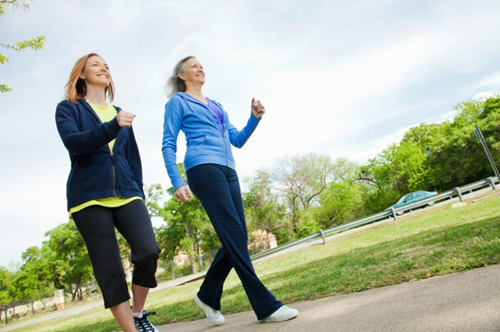Walking is one of the simplest and most accessible forms of physical activity, yet it can have profound effects on your health and well-being. It does not require any special equipment, skills, or facilities, and it can be done almost anywhere and anytime. One of the benefits of walking is that it is also a low-impact and gentle exercise that is suitable for people of all ages and fitness levels.
Whether you walk for leisure, transportation, or fitness, you can enjoy the many advantages of walking. Walking can help you burn calories, strengthen your heart, ease your joint pain, boost your immune system, increase your energy, and enhance your creativity. Walking can also improve your mood, reduce your stress, and connect you with nature and others. Here are some of the reasons why walking is a good choice for your body and mind.
Benefits of Walking
Walking can help you:
1) Burn calories and lose weight.
Walking at a brisk pace is an effective way to increase your metabolic rate and help you burn stored fat. Your metabolic rate is the amount of energy your body uses to perform its functions, such as breathing, digesting, and maintaining your temperature. When you walk faster, your muscles work harder and require more oxygen and fuel, which boosts your metabolism and calorie burn. The number of calories you burn while walking depends on several factors, such as your speed, distance, terrain, and weight.

Generally, the faster, longer, and steeper you walk, the more calories you burn. Your weight also affects your calorie burn, as heavier people use more energy to move than lighter people. You can use a calorie calculator to estimate how many calories you burn walking based on these factors.
2) Strengthen your heart and lower your blood pressure
Walking regularly can have a positive impact on your cardiovascular and metabolic health. According to a study, the benefits of walking at a moderate intensity for at least 30 minutes a day, five days a week, can lower your risk of coronary heart disease by about 19 percent. This is because walking can improve your blood circulation, lower your blood pressure, and increase your HDL (“good”) cholesterol.

Walking can also help you control your blood sugar levels and enhance your insulin sensitivity, which are important factors for preventing or managing type 2 diabetes. Walking can stimulate your muscles to use glucose more efficiently and reduce your insulin resistance, which can lower your risk of developing type 2 diabetes or improve your diabetes management. Therefore, walking is a simple and effective way to improve your heart and blood sugar health.
3) Ease your joint pain and prevent arthritis.
Walking regularly can have a positive impact on your joint health and function. Walking can lubricate your joints by increasing the production and circulation of synovial fluid, which nourishes and protects the cartilage. Walking can also strengthen the muscles that support your joints, which can reduce the pressure and friction on your cartilage.

One of the best benefits of walking is that it can also reduce inflammation and pain associated with arthritis by stimulating the release of natural anti-inflammatory substances and endorphins. Walking five to six miles a week can even prevent arthritis from forming in the first place by maintaining the thickness and integrity of your cartilage. Therefore, walking is a simple and effective way to improve your joint health and prevent or manage arthritis.
4) Boost your immune system and fight infections.
Walking regularly can have a positive impact on your lymphatic system, which is a vital part of your immune system. The lymphatic system consists of a network of vessels and nodes that carry fluid called lymph, which contains white blood cells that fight infections. Walking can help move the lymph fluid through your body and stimulate the production and activity of these immune cells. Walking can also help clear out any bacteria, viruses, or toxins that may be trapped in the lymph nodes.
Also the benefits of walking can also help you cope with stress, which can weaken your immune system and make you more susceptible to illness. Walking can lower the levels of stress hormones, such as cortisol and adrenaline, which can cause inflammation and impair your immune response. Walking can also increase the levels of endorphins, which are natural painkillers and mood boosters that can enhance your well-being and immunity.
Walking for 20 minutes a day, five days a week, can reduce your sick days by 43 percent, according to a study of over 1,000 adults during flu season. This means that walking can not only prevent or reduce the severity of common colds and flu but also lower your risk of developing more serious infections or diseases. Therefore, walking is a simple and effective way to boost your immune system and protect your health.
5) Increase your energy and creativity.
Walking regularly can have a positive impact on your blood circulation and oxygen delivery to your cells, which are essential for your energy levels and brain function. When you walk, your heart rate and blood pressure increase, which improves the blood flow to your brain and other organs. This can enhance your cognitive abilities, such as memory, attention, and problem-solving. Walking can also stimulate your neural pathways, which are the connections between your brain cells that enable communication and learning. Walking can activate various regions of your brain and increase the production of new brain cells and synapses. This can spark new ideas and foster creativity, especially when you walk in a novel or stimulating environment.
Walking in nature or in a pleasant environment can further enhance your cognitive performance and creativity by providing additional benefits. Walking in nature can reduce your stress levels, which can impair your cognition and mood. Walking in nature can also increase your exposure to natural light, which can regulate your circadian rhythm and improve your sleep quality. The benefits of walking in a pleasant environment can increase your positive emotions, which can boost your motivation and confidence. Walking in a pleasant environment can also expose you to diverse and inspiring stimuli, which can enrich your imagination and originality. Therefore, walking is a simple and effective way to improve your blood circulation, oxygen delivery, neural pathways, cognitive performance, and creativity.
Tips for Walking
To get the most out of the benefits of walking, follow these tips:
- Start slowly and gradually increase your intensity and duration. If you are new to walking or have been inactive for a long time, start with short and easy walks and build up your stamina and confidence. Aim for at least 150 minutes of moderate-intensity walking per week, or 75 minutes of vigorous-intensity walking per week.
- Set realistic and specific goals and track your progress. Having a clear and measurable goal can motivate you to stick to your walking routine and celebrate your achievements. You can use a pedometer, a smartphone app, or a fitness tracker to monitor your steps, distance, time, and calories burned.
- Wear comfortable and supportive shoes and clothing. Choose shoes that fit well and have good cushioning and arch support. Avoid shoes that are too tight, too loose, or too worn out. Wear loose, breathable, and weather-appropriate clothing that allows you to move freely and stay comfortable.
- Walk with good posture and technique. Keep your head up, your shoulders relaxed, and your core tightened. Swing your arms naturally and bend your elbows at a 90-degree angle. Land on your heel and roll through your foot to push off with your toes. Avoid slouching, leaning, or bouncing.
- Walk in safe and enjoyable places. Choose well-lit, well-paved, and well-populated areas to walk in. Avoid walking on uneven, slippery, or isolated surfaces. If you walk at night or in low-visibility conditions, wear a reflective vest or a light so cars can see you. If you walk with headphones, keep the volume low and be aware of your surroundings. You can also walk with a friend, a family member, a pet, or a group for more fun and security.
Exploring the benefits of walking is simple, effective, and enjoyable to improve your health and quality of life. By making walking a regular part of your routine, you can reap the many benefits of walking and make it a good choice for yourself. Happy walking!




